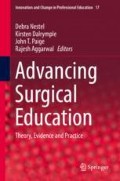Overview
This chapter explores a constructivist theory that can inform the design of surgical education and training programs, especially to address areas of particular challenge. Threshold concepts, troublesome knowledge and threshold capability are introduced and illustrated in paediatric surgical training and transition to cardiothoracic surgical practice. Like other theories in this section, threshold concepts involve transformation of individuals’ ways of thinking, movement through a liminal state. This transformation is often associated with the development of a professional identity and represents an ontological shift in how the individual sees themselves and may reflect how others see them too. Learners can, however, sometimes find themselves in a stuck place where they can move neither forwards nor backwards. The ideas explored in this chapter may provide insights with which educators can help learners to move beyond their current state, to anticipate and plan for troublesome areas in learning, so that they can successfully navigate transitions.
Access this chapter
Tax calculation will be finalised at checkout
Purchases are for personal use only
References
Sharples, M., et al. (2014). Innovating pedagogy 2014. In Open University Innovation Report 3. Milton Keynes: The Open University.
Meyer, R., & Land, R. (2003). Threshold concepts and troublesome knowledge: Linkages to ways of thinking and practising within the disciplines, In ETL Project. Coventry: Universities of Edinburgh.
Neve, H., Wearn, A., & Collett, T. (2015). What are threshold concepts and how can they inform medical education? Medical Teacher, 1–4.
Barradell, S. (2013). The identification of threshold concepts: A review of theoretical complexities and methodological challenges. Higher Education, 65, 265–276.
Rowbottom, D. P. (2007). Demystifying threshold concepts. Journal of Philospophy of Education, 41, 263–270.
Land, R. (2011). There could be trouble ahead: Using threshold concepts as a tool of analysis. International Journal for Academic Development, 16, 175–178.
O’Donnell, R. (2010). A critique of the threshold concept hypothesis and an application in economics. Working paper 164. [cited 2014 October 5th]. Available from: http://www.finance.uts.edu.au/research/wpapers/wp164.pdf
Perkins, D. (1999). The many faces of constructivism. Educational Leadership, 57, 6–11.
Festinger, L. (1957). A theory of cognitive dissonance. Stanford: Stanford University Press.
Mezirow, J. (2000). Learning as transformation: Critical perspectives on a theory in Progress. New York: Wiley.
Schwartzman, L. (2010). Transcending disciplinary boundaries. A proposed theoretical foundation for threshold concepts. In J. H. Meyer, R. Land, & C. Baillie (Eds.), Threshold concepts and transformational learning (pp. 21–44). Rotterdam: Sense Publishers.
Wearn, A., O’Callaghan, A., & Barrow, M. (2016). Becoming a different doctor: Identifying threshold concepts when doctors in training spend six months with a hospital palliative care team. In R. Land, J. Meyer, & M. Flanagan (Eds.), Threshold concepts in practice. Rotterdam: Sense Publishers.
Meyer, J., & Land, R. (2005). Threshold concepts and troublesome knowledge (2): Epistemological considerations and a conceptual framework for teaching and learning. Higher Education, 49(3), 373–388.
Gennep, A. V. (1960). The rites of passage. London: Routledge & Kegan Paul Ltd.
Goethe, R. (2003). Ritual and liminality (NCSS theme: Culture) – purpose, background, and context. Available from: http://www.uiowa.edu/~socialed/lessons/rituals.htm
Bowden, J. (2004). Capabilities driven curriculum design. In C. Baillie & I. Moore (Eds.), Effective teaching and learning in engineering (pp. 36–47). London: Kogan Page.
Male, S., et al. (2016). Students’ experiences of threshold capability development with intensive mode teaching. In M. A. Davis & A. Goody (Eds.), Research and development in higher education: The shape of higher education (pp. 192–201). Hammondville: HERDSA.
Land, R., & Meyer, J. (2011). The scalpel and the ‘Mask’: Threshold concepts and surgical education. In H. Fry & R. Kneebone (Eds.), Surgical education: Theorising an emerging domain (pp. 91–106). London: Springer.
Blackburn, S., & Nestel, D. (2014). Troublesome knowledge in paediatric surgical trainees: A qualitative study. Journal of Surgical Education, 71(5), 756–761.
Rees-Lee, J., & O’Donoghue, J. (2009). Inspirational surgical education: The way to a mature specialist identity. Journal of Plastic, Reconstructive & Aesthetic Surgery, 62(5), 564–567.
Moulton, C. A., et al. (2007). Slowing down when you should: A new model of expert judgment. Academic Medicine, 82(10 Suppl), S109–S116.
Jin, C. J., et al. (2012). Pressures to “measure up” in surgery: Managing your image and managing your patient. Annals of Surgery, 256, 989–993.
Baillie, C., Bowden, J. A., & Meyer, J. H. (2013). Threshold capabilities: Threshold concepts and knowledge capability linked through variation theory. Higher Education, 65, 227–246.
Luu, S., Leung, S. O., & Moulton, C. A. (2012). When bad things happen to good surgeons: Reactions to adverse events. The Surgical Clinics of North America, 92(1), 153–161.
Luu, S., et al. (2012). Waking up the next morning: Surgeons’ emotional reactions to adverse events. Medical Education, 46(12), 1179–1188.
Meyer, J. H., & Land, R. (2005). Threshold concepts and troublesome knowledge (2): Epistemological considerations and a conceptual framework for teaching and learning. Higher Education, 49, 373–388.
RACS. (2014). Preparation for practice. [cited 2014 October 5th]. Available from: http://www.surgeons.org/for-health-professionals/register-courses-events/professional-development/preparation-for-practice/
Evgeniou, E., & Loizou, P. (2012). The theoretical base of e-learning and its role in surgical education. Journal of Surgical Education, 69, 665–669.
Kneebone, R. (2009). Perspective: Simulation and transformational change: The paradox of expertise. Academic Medicine, 84, 954–957.
Author information
Authors and Affiliations
Corresponding author
Editor information
Editors and Affiliations
Rights and permissions
Copyright information
© 2019 Springer Nature Singapore Pte Ltd.
About this chapter
Cite this chapter
Blackburn, S., Smith, J., Nestel, D. (2019). Helping Learners Through Transitions: Threshold Concepts, Troublesome Knowledge and Threshold Capability Framework in Surgery. In: Nestel, D., Dalrymple, K., Paige, J., Aggarwal, R. (eds) Advancing Surgical Education. Innovation and Change in Professional Education, vol 17. Springer, Singapore. https://doi.org/10.1007/978-981-13-3128-2_8
Download citation
DOI: https://doi.org/10.1007/978-981-13-3128-2_8
Published:
Publisher Name: Springer, Singapore
Print ISBN: 978-981-13-3127-5
Online ISBN: 978-981-13-3128-2
eBook Packages: EducationEducation (R0)

